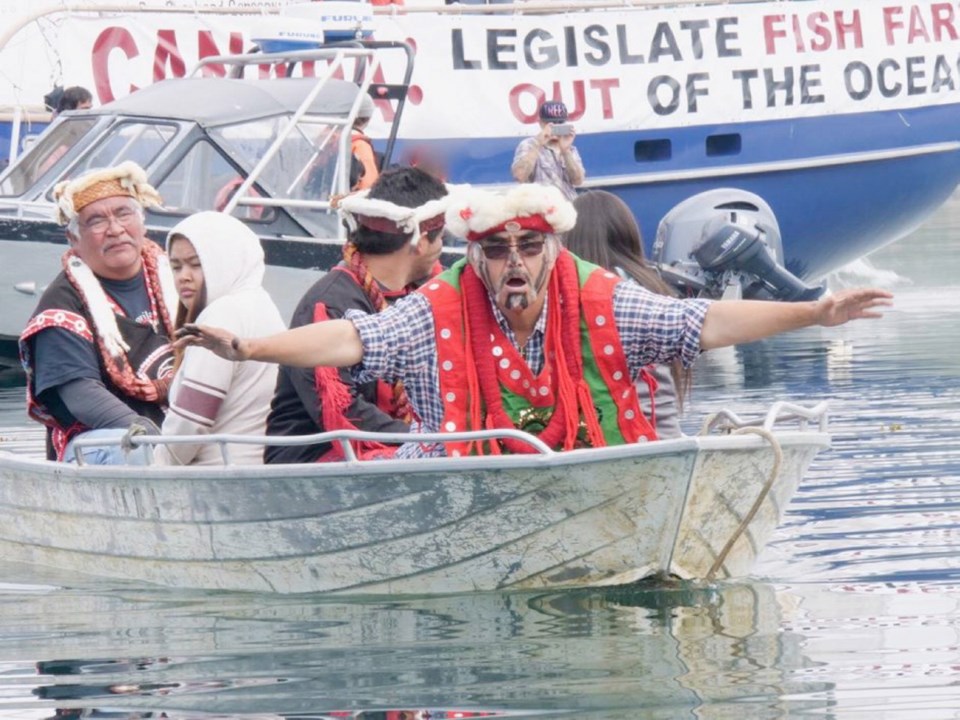A growing group of First Nations and activists is occupying a salmon farm on Swanson Island, near Alert Bay, and calling on the federal and provincial governments to end open-net fish farming on the Pacific coast.
“My family and I are really frustrated with the lack of movement on removing fish farms. We will be here as long as it takes,” said Ernest Alfred, a hereditary chief from the Namgis, Lawit’sis and Mamalilikala nations.
People brought food and supplies Monday, as they plan to build a shelter at the site.
“We’ve been fighting this for 30 years and it’s got to stop. It’s business as usual for the companies, but an ecological disaster for us,” he said.
Alfred and a small group boarded the fish farm, owned by the Norwegian-based company Marine Harvest, on Aug. 23, after a brief occupation of a Cermaq-owned farm on Burdwood Island, along with other area chiefs.
Ian Roberts, a spokesman for Marine Harvest, said the company is aware of the protesters and does not have an issue with them observing operations safely. He said the company is working to set up a meeting with Namgis chief Don Svanvik but has not been successful.
“Over the past several years, we have contacted the Namgis First Nation to request a meeting to discuss our business. To date, we have not had a meeting,” said Roberts, who confirmed the farm does not have a co-operative agreement with a local First Nation.
He said the company has eight operations in the area and employs about 150 people, with some Indigenous employees.
The fish-farm occupation followed the release of underwater video and photos from salmon farm pens along the Broughton Archipelago that show emaciated fish and deformities the groups fear are symptoms of dangerous viruses.
“As a biologist, I have never seen anything like what’s wrong with these fish,” said Alexandra Morton, a fish-farm critic who is on the Sea Shepherd research vessel Martin Sheen at the occupation.
Morton said every fish farm in the region is along a wild-salmon migratory route and is a threat to local ecosystems. She said fish farms are well-documented to have a negative effect on wild stocks through colonization, the spread of viruses and sea lice.
The escape of thousands of Atlantic salmon from an imploded net pen in the San Juan Islands this month led to further calls to close the farms and move to land-based operations. In response to the escape, Washington state issued a moratorium on new net-pen permits.
B.C. Agriculture Minister Lana Popham said Monday the provincial government has put a hold on new tenure permits for salmon farms. The last tenure permits issued were to four operations in 2015.
She said her ministry hasn’t been contacted by the protesters, but that she looks forward to meeting First Nations leaders in Vancouver next month to discuss the transition of open-net fish farms to land-based operations.
“We promised we’d do that in partnership with the industry and First Nations, and we’re committed to that, to investing in technology and that transition,” she said, adding existing tenure permits could be revoked “where applicable.”
The federal government has jurisdiction over the oceans and issues the operating licences for fish farms. Fisheries Minister Dominic LeBlanc said Monday he was aware of the protest at Swanson Island, but did not respond to the call to remove the farms.
In an email, he noted the government recently renewed a commitment to working nation-to-nation with Indigenous Peoples.
Fin Donnelly, the federal New Democrat fisheries critic, said the government has repeatedly turned down attempts to move the fish-farm industry to land-based operations.
“They said the industry had it under control, which clearly it doesn’t,” said Donnelly. He said the fish-farm industry is an important player in the economy, but that it shouldn’t be at the expense of wild salmon or the environment.
“Both industries need to be treated fairly to thrive,” said Donnelly, which is why he thinks investment in land-based fish farming is the way to go. He pointed to the Namgis First Nation pilot project, Kuterra, which showed potential, but needs investment and incentives to scale up competitive production levels.



